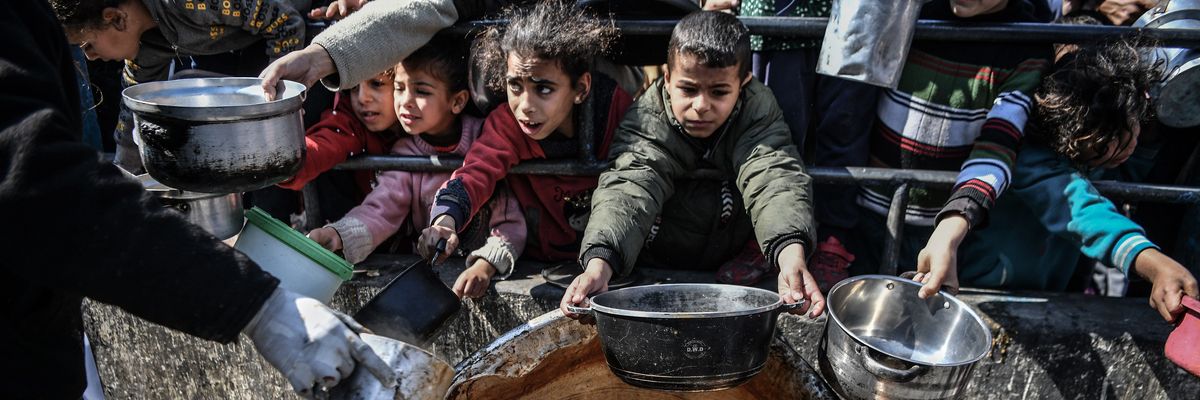In the month since the International Court of Justice handed down its interim ruling in the genocide case brought by South Africa, the Israeli government has continued to impede the delivery of humanitarian aid to the Gaza Strip in violation of the court's order, Human Rights Watch said Monday.
The ICJ's January 26 ruling, which is legally binding, requires Israel to do everything in its power to prevent acts of genocide in Gaza and ensure that basic assistance flows to the enclave's population.
But according to Human Rights Watch (HRW), "the daily average number of trucks entering Gaza with food, aid, and medicine dropped by more than a third in the weeks following the ICJ ruling: 93 trucks between January 27 and February 21, 2024, compared to 147 trucks between January 1 and 26, and only 57 between February 9 and 21."
HRW's analysis comes on the day the Israeli government is set to deliver its own 30-day assessment of compliance with the ICJ decision, which stated that Israel is plausibly committing genocide against Palestinians in Gaza. The Times of Israelreported late Sunday that the government report "is being drafted by the Justice Ministry and the Foreign Ministry but will not be released to the press or general public, and both ministries have been extremely tight-lipped about the information in the document."
Observers don't expect the government's self-assessment to reflect the catastrophic reality on the ground in Gaza, where most people are starving and at growing risk of infectious disease due to the scarcity of clean water and adequate shelter. U.S.-backed Israeli forces have been accused of firing on aid convoys and targeting crowds of civilians gathering to receive food and other assistance.
In desperation, some Gazans have resorted to eating grass and animal feed and drinking contaminated water. A majority of Gaza's population is currently crowded into the city of Rafah, which Israel plans to invade whether or not there's a cease-fire deal with Hamas.
"The Israeli government is starving Gaza's 2.3 million Palestinians, putting them in even more peril than before the World Court's binding order," Omar Shakir, HRW's Israel and Palestine director, said in a statement Monday. "The Israeli government has simply ignored the court's ruling, and in some ways even intensified its repression, including further blocking lifesaving aid."
"Failure to ensure Israel's compliance puts the lives of millions of Palestinians at risk."
HRW's analysis notes that in addition to blocking food aid and medicine shipments, Israeli authorities have also obstructed the delivery of fuel, the lack of which has forced many of Gaza's hospitals to shut down.
"Between February 1 and 15, Israeli authorities only facilitated 2 of 21 planned missions to deliver fuel to the north of the Wadi Gaza area in central Gaza and none of the 16 planned fuel delivery or assessment missions to water and wastewater pumping stations in the north," the group said. "Fewer than 20% of planned missions to deliver fuel and undertake assessments north of Wadi Gaza have been facilitated between January 1 and February 15, as compared with 86% of missions planned between October and December."
Israel's mass killing of Gazans has also not stopped in the wake of the ICJ order, HRW said Monday. Pointing to figures from Gaza's health ministry, the group noted that Israeli forces killed more than 3,400 people in the Palestinian enclave between the day of the ICJ ruling and February 23.
"Israel's blatant disregard for the World Court's order poses a direct challenge to the rules-based international order," Shakir said. "Failure to ensure Israel's compliance puts the lives of millions of Palestinians at risk and threatens to undermine the institutions charged with ensuring respect for international law and the system that ensures civilian protection worldwide."
The Geneva-based Euro-Mediterranean Human Rights Monitor similarly concluded in a report released over the weekend that Israel is in "flagrant violation" of the ICJ's order.
The group implored the international community "to uphold its legal and moral duties to the people of the Gaza Strip, and to ensure that the ICJ ruling is carried out to prevent the crime of genocide in the Gaza Strip."
